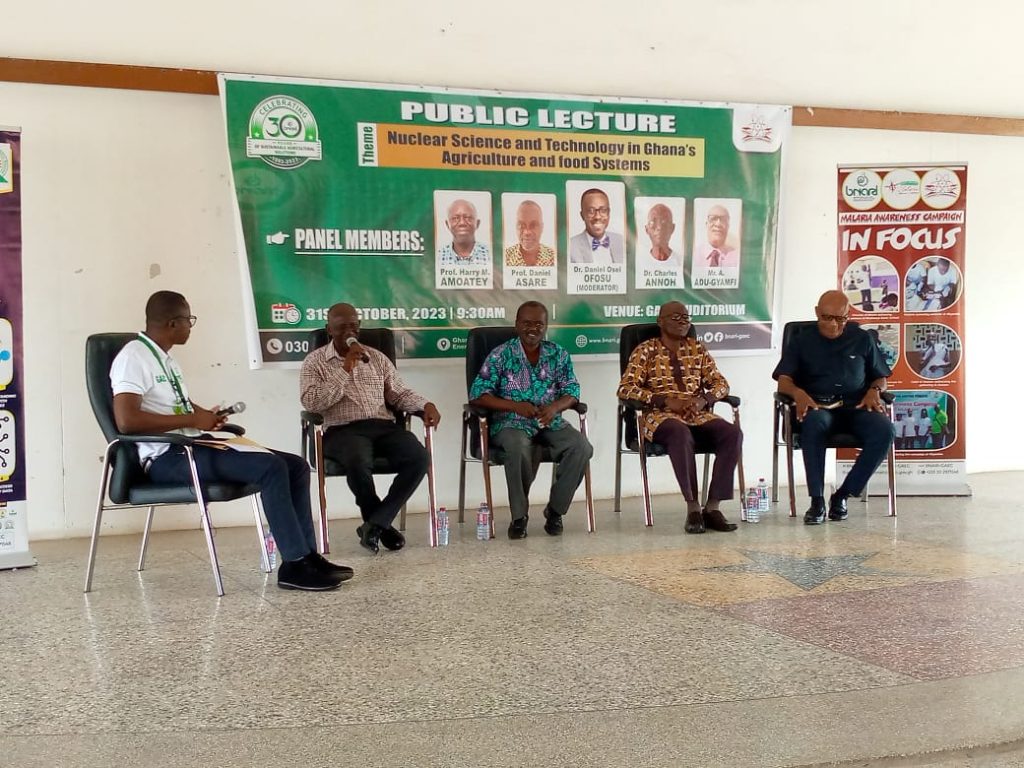Accra, Nov. 01, GNA- Ghanaian Nuclear Research Scientists have been challenged to boldly document their achievements for proper validation, especially with institutions like the International Atomic Energy Agency (IAEA), for acknowledgement and global acceptance.
Professor Harry Amoatey, an Associate Professor of Plant Breeding at the Department of Nuclear Agriculture and Radiation processing, University of Ghana Graduate School of Nuclear and Allied Science (SNAS) at Atomic, who threw the challenge, said although several breakthroughs had been made by these group, public knowledge about their achievements were scanty.
He encouraged the researchers to make some noise through increased media collaborations for publicity and partnering with the Food and Drugs Authority for linkages to big export companies facing challenges with their products.
They were also urged to diligently pursue demand-driven research to sustain clients and target flagship programmes for impact and recognition.
Prof. Amoatey was speaking at a public lecture organised by the Biotechnology and Nuclear Agriculture Research Institute (BNARI) of the Ghana Atomic Energy Commission (GAEC), on the theme: “Nuclear Science and Technology in Ghana’s Agriculture and Food Systems.”
It is the second of the series of lectures scheduled to mark the 30th anniversary celebrations of BNARI.
Prof. Amoatey gave highlights on some achievements of researchers and scientists of the Institute, which included breakthrough solutions for insect and pest control using the Sterile Insect Technology (SIT), to prevent the development of embryos of the Tsetse fly, to reduce their population overtime to the barest, so they no longer posed threats.
He said apart from being environmentally friendly and economically viable, the SIT targeted specific species and ensured high returns on investment.
“Currently, global efforts are ongoing to apply the same technology to mosquitoes, while other studies are underway to address the issue of the fruit fly using SIT,” he said.
Other achievements included the control of the coconut and palm tree beetle that cause damage to the leaves, preventing matured plants from bearing fruits.
Prof. Amoatey cited the use of Gamma Irradiation facility by BNARI, for preventing post-harvest losses, where crops and processed food packages were taken through a specialised nuclear technology process to slow down disease causing organisms, prevent insect infestation and prolong self-life of products.

“We have used this technology for the preservation of cereals, grains and yam for export, recording good results,” he said.
He also mentioned the crop improvement technique using mutation breeding and BNARI had to its credit over two decades of the mutant variety of cassava known as “Tek bankye,” which had a high dry matter content.
Achievements including the development of the dwarf coconut and oil palm trees, and the mutated high yield cocoa crop that was resistant to the swollen shoot disease, were made possible through the mutation breed technology using the gamma irradiation process.
“Other works have been done on sorghum and cowpea to produce high yielding and pest resistant varieties, while research like soil water management to determine the correct amount of fertilizer needed had been carried out, for improved agriculture in Ghana.”
Prof. Amoatey, later joined his colleague lecturers from SNAS, involving Prof. Daniel Asare, Dr Charles Annoh and Mr Abraham Adu-Gyamfi, in a panel discussion to further elaborate on the topic.
The panelists unanimously applauded the peaceful application of nuclear technology in Ghana’s agriculture by BNARI and called for new funding strategies, partnering government and other stakeholders, to attract commercial businesses to use the gamma irradiation facility for their product preservation.
They encouraged the youth to opt for agriculture as business rather than a hobby and to acquire knowledge from the Soil Research Institute of the Council for Scientific and Industrial Research, on Ghana’s soil map, for specific crop production.
Prof. Samuel Boakye Dampare, the Director-General, GAEC, called for renewed efforts to project and support the work of BNARI, highlighting the huge potential of the Institute as a low hanging fruit for Ghana’s agriculture development.
Dr Michael Y. Osae, the Director of BINARI, thanked the speakers for their insight and admitted that the Institute must do more to sell itself and called on all its scientists to join hands to reshape the story.
BNARI was established in 1993 by upgrading the then Department of Biology, Food and Agriculture under the National Nuclear Research Institute (NNRI).
It was established as one of the research and technology transfer institutes of GAEC with a mandate which stems from that of the Commission on peaceful applications of nuclear and related techniques for socio-economic development.
GNA